Bubblegum is pop music in a catchy and upbeat style that is marketed for children and adolescents. The term also refers to a more specific rock and pop subgenre, originating in the United States in the late 1960s, that evolved from garage rock, novelty songs, and the Brill Building sound, and which was also defined by its target demographic of preteens and young teenagers. The Archies' 1969 hit "Sugar, Sugar" was a representative example that led to cartoon rock, a short-lived trend of Saturday-morning cartoon series that heavily featured pop rock songs in the bubblegum vein.

The Lemon Pipers were a short-lived 1960s American rock band from Oxford, Ohio, United States, known chiefly for their song "Green Tambourine", which reached No. 1 in the United States in 1968. The song has been credited as being the first bubblegum pop chart-topper.

"Along Comes Mary" is a song composed by Tandyn Almer, originally recorded by American sunshine pop band the Association. It was the group's first hit, released in March 1966 as the lead single prior to their debut album, And Then... Along Comes the Association, which appeared in July.
"Emma" is a 1974 song by the British soul band Hot Chocolate. Written by band members Errol Brown (vocals) and Tony Wilson (music), the song address themes of suicide, early death and lost childhood. Brown's lyrics celebrate his recently deceased mother. Their rawness was developed after the producer Mickie Most asked him for further "depth and darkness".

"Last Train to Clarksville" is a song by American rock band the Monkees. It was released as the band's debut single on August 16, 1966, and was later included on the group's self-titled album, which was released on October 10, 1966. The song, written by Tommy Boyce and Bobby Hart, was recorded at RCA Victor Studio B in Hollywood on July 25, 1966, and was already on the Boss Radio "Hit Bounds" playlist on August 17, 1966. The song topped the Billboard Hot 100 for the week ending November 5, 1966. Lead vocals were performed by the Monkees' drummer, Micky Dolenz. "Last Train to Clarksville" was featured in seven episodes of the band's television series, the most for any Monkees song.
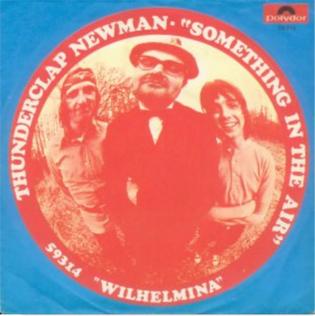
"Something in the Air" is the debut single by English rock band Thunderclap Newman, written by Speedy Keen who also sang the song. It was a No. 1 single for three weeks in the UK Singles Chart in July 1969. The song has been used for films, television and adverts, and has been covered by several artists. The track was also included on Thunderclap Newman's only album release Hollywood Dream over a year later.

"Saturday Night" is a song recorded by the Scottish pop rock band Bay City Rollers. It was written and produced by Bill Martin and Phil Coulter. The tune is an upbeat rock number with a memorable hook, in which the word "Saturday" is spelled out in a rhythmic, enthusiastic chant.

"I Want Candy" is a song written and originally recorded by the Strangeloves in 1965 that reached No. 11 on the US Billboard Hot 100 chart. It is a famous example of a song that uses the Bo Diddley beat.

"Yummy Yummy Yummy" is a song by Arthur Resnick and Joey Levine, first recorded by Ohio Express in 1968. Their version reached No. 4 on the U.S. Pop Singles chart in June and No. 5 on the UK Singles Chart. It has since been covered by many artists. Ohio Express was a studio concoction and none of the "official" members appear on the record. Joey Levine sang lead vocals.
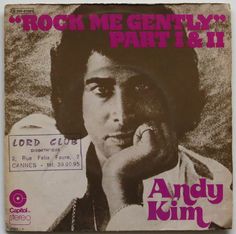
"Rock Me Gently" is a song by Andy Kim, released as a single in 1974.
"Catch a Falling Star" is a song written by Paul Vance and Lee Pockriss. It was made famous by Perry Como who recorded and released his version in late 1957.

"Never My Love" is a pop standard written by American siblings Don and Dick Addrisi, and best known from a hit 1967 recording by the Association. The Addrisi Brothers had two Top 40 hits as recording artists, but their biggest success as songwriters was "Never My Love". Recorded by dozens of notable artists in the decades since, in 1999 the music publishing rights organization Broadcast Music, Inc. (BMI) announced it was the second most-played song on radio and television of the 20th century in the U.S.

"The Rain, the Park & Other Things" is a pop song with music and lyrics co-written by Artie Kornfeld and Steve Duboff. It was recorded by the pop band the Cowsills, and included on their 1967 self-titled debut album. Released as a single, the song reached No. 2 on the Billboard charts. It was kept from the No. 1 spot by "Daydream Believer" by the Monkees. The single cemented the group's international popularity and sold some three million copies over the years. It ties with 1969's "Hair" as the group's biggest hit, as both reached No. 2 in the US. In Canada, "The Rain, the Park & Other Things" reached No. 1 on the RPM singles chart.
"Mirage" is a song by the American rock and roll group Tommy James and the Shondells, released as a single on 5 January 1967 on the Roulette Records label.
"Simon Says" is a bubblegum pop song written by Elliot Chiprut and originally recorded in 1967 by the 1910 Fruitgum Company, becoming their most successful chart hit.

"1, 2, 3, Red Light" is a song written by Sal Trimachi and Bobbi Trimachi and was recorded by 1910 Fruitgum Company for their 1968 album, 1, 2, 3, Red Light. The song charted highest in Canada, going to number 1 on the RPM 100 national singles chart in 1968. In the same year in the US, it went to number 5 on the Billboard Hot 100 and was on the charts for 13 weeks.
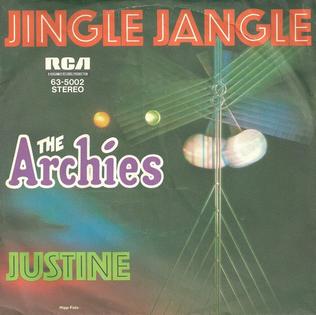
"Jingle Jangle" is a song written by Jeff Barry and Andy Kim, produced by Barry and recorded by The Archies, a fictional bubblegum pop band from Archie Comics. It was released as the group's fourth single on the Kirshner Records label in November 1969, and included on their third album, Jingle Jangle. It reached number 10 on the Billboard Hot 100 and number 27 on the U.S. Easy Listening chart in 1969. In January 1970, it went to number 1 for one week in Canada.
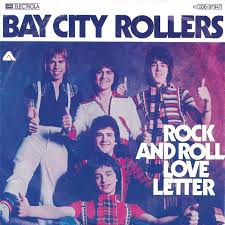
"Rock and Roll Love Letter" is the second single from American Tim Moore's second album, Behind the Eyes. Tim Moore's original version was not successful. It was later covered by the band Bay City Rollers, and that version became a Top 40 hit.
"Mr. Sun, Mr. Moon" is a song by the American rock band Paul Revere & the Raiders written by Mark Lindsay originally released as a single in 1969, then on the album Hard 'N' Heavy later that year. The song peaked at number 18 on the Billboard Hot 100, number 15 on the Cash Box Top 100 Singles chart, and at number 8 on the RPM Top Singles chart.
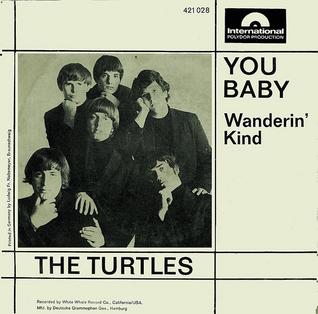
"You Baby" is a song written by P.F. Sloan and Steve Barri and was originally recorded by the Vogues in 1965, though their version was not released until 1996.














